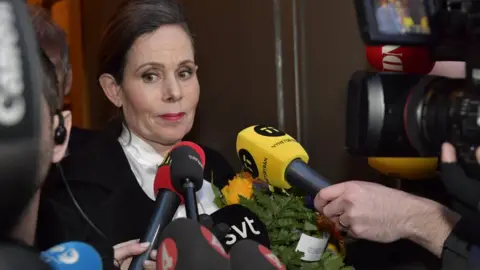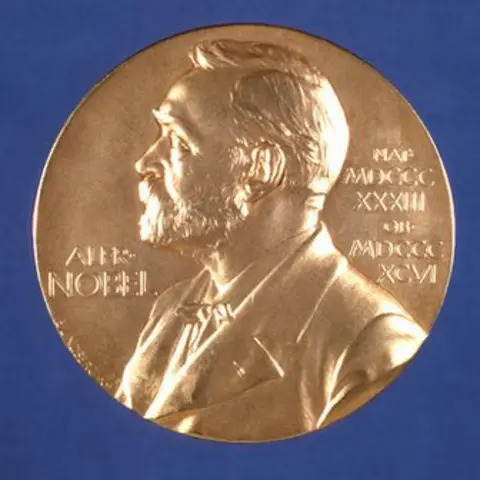Nobel Literature Prize: Why this year's award was postponed
 Getty Images
Getty ImagesThe decision to postpone the award of the Nobel Prize for Literature - one of the oldest and most prestigious cultural awards - follows a crisis over sexual assault allegations at the organisation which decides the winner.
The Swedish Academy is under fire for how it dealt with alleged misconduct by French photographer Jean-Claude Arnault, who is married to a former member of the centuries-old institution.
The academy says it will now announce the 2018 winner along with the 2019 winner next year.
How did the scandal develop?
Last November, inspired by the #MeToo campaign, 18 women made allegations of sexual assault and harassment against Mr Arnault. Several of the alleged incidents reportedly happened in properties belonging to the academy. He denies all the allegations.
The organisation then voted against removing his wife, the poet and writer Katarina Frostenson from its 18-person committee.
This, along with accusations of conflict of interest and the leaking of Nobel winners' names is said to have divided the organisation and has sparked a wave of resignations, including Ms Frostenson and the head of the academy, Prof Sara Danius, leaving just 11 members in place.
Normally secretive, academy members have attacked each other in public. One member, Horace Engdahl, called some of those resigning "sore losers" and described Prof Danius as the worst permanent secretary ever.
Her supporters see Prof Danius as a reformer battling a patriarchal institution. After she quit some of them, including Sweden's culture minister, posted photos of themselves wearing a blouse favoured by Prof Danius in solidarity.
 EPA
EPATechnically members cannot resign from their positions, which are for life, but they can stop participating in academy activities. The Swedish King King Carl XVI Gustaf says he will change those rules.
Arnault has also been accused of groping the heir to the Swedish throne, Crown Princess Victoria, in 2006, something he denies.
So what next?
 Nobel Foundation
Nobel FoundationThe academy said the decision to postpone this year's prize had been made due to a lack of public confidence.
"The Academy needs time to regain its full complement, engage a larger number of active members and regain confidence in its work," it said in a statement.
Swedish National Television (SVT)'s culture editor Rebecca Lundberg, who has covered the woes extensively, told the BBC: "It's very sad to all the authors... but it was a necessary decision.
"They have huge work to do. They have to recruit new members and that will be really hard. A lot of people don't want to be associated with the current academy."
The Swedish Academy also announced a review of its statutes and practices. In an earlier statement, it said the Nobel Prize for Literature's reputation had suffered "greatly", promising a plan to restore public confidence in the organisation.
The academy's decision may have been influenced by the #MeToo campaign, which highlighted the extent of sexual assault in a number of countries. Potential winners may have found it difficult to accept the prize with the academy facing questions too.
How unusual is this?
The circumstances that led to this year's award being postponed are unique but there have been years without a Nobel Prize for Literature.
The prize has not been given out seven times in total, mostly during war years, although in 1935 it was thought no candidate deserved the prize. The last time there was no award was in 1943.
Previous winners provide a formidable, eclectic mix.
Recent years saw both US singer Bob Dylan and Belarusian writer and journalist Svetlana Alexievich claim the prize, while other recipients include Nigeria's Wole Soyinka, Colombian novelist Gabriel García Márquez, dissident Russian author Alexandr Solzhenitsyn and Indian great Rabindranath Tagore.
